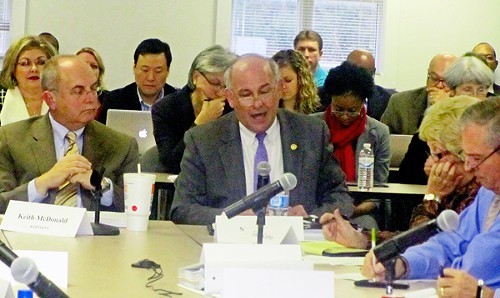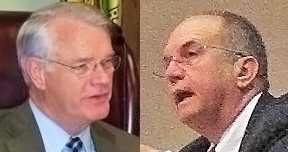Can a compromise be reached on the increasingly complicated school-merger issue? The question was sure to get a workout at Thursday afternoon’s session of the Transition Planning Commission — a summit meeting of sorts, with sub urban mayors appearing before the TPC to discuss the shape of things to come.
Meanwhile, two of the principals at the meeting were elaborating on their positions.
Shelby County Mayor Mark Luttrell confirmed to the Flyer that a 2010 opinion on a Gibson County case by state Attorney General Robert Cooper was the basis for his doubts that separate suburban school districts could qualify for mandatory county funding under the state’s A.D.A. (average daily attendance) distribution formula.
But Luttrell, who said he was banking on an interpretation of that opinion by County Attorney Kelley Rayne, said he was open to considering “contractual” arrangements with breakaway districts.
Simultaneously, Bartlett Mayor Keith McDonald, one of the leading figures in the move toward autonomous suburban school districts (and, like Luttrell, a member of the TPC himself) said he did not believe the two-year-old Cooper opinion had relevance to Shelby County or to the taxing formulas proposed to finance the suburban districts.
These involved municipal add-ons to residents’ property tax or sales tax obligations or both, as per advice rendered the suburbs by Southern Educational Strategies, their common consultants.
McDonald acknowledged that the litigation on the funding issue, as well as on the question of compensation for the transfer of school properties to the proposed new districts, could stretch past August 2013, established by the Norris-Todd Act as the target date for completion of city/county merger and the earliest date for establishment of independent municipal school districts.
“That’s if the problem has to be solved in the courts and can’t be resolved by legislation,” said McDonald, who repeated that independent districts remained the goal for the suburbs and that a compromise proposal for converting the suburban schools into charter schools under the jurisdiction of the Uniform Shelby County School Board was a “Plan B” alternative, at best.
Luttrell noted the obvious, however — that even if the dispute over transfer of school properties could be accomplished without additional cost to the suburbs, the problem of whether county financial support would be mandated for the new districts remained an obstacle to their creation. And he said it was his view that the 2010 Cooper opinion was general enough in its application to apply to Shelby County.
Key portions of the Cooper opinion state, “[i]f a municipal or special school district is operating in a county, then that district is accountable to the state for the operation of the municipal or special school systems, not the county or the county school system. Nothing in the statutes requires the county to oversee or be responsible for municipal, special, or other school districts that operate within the county’s borders….”
Other municipalities besides Bartlett engaged actively in the pursuit of new municipal school districts are Germantown, Collierville, Arlington, and Lakeland — all of which intend to conduct May referenda of their residents on the question. Millington may also seek a municipal district.
Presumably, alternatives to the establishment of separate suburban school districts — a number of which have been suggested at previous meetings of the TPC — were to be discussed at Thursday afternoon’s TPC meeting. These would include the oft-mentioned “chancery model,” involving a loose confederation of largely autonomous areas under the general supervision of a common school board.
UPDATE (DETAILS FROM TPC MEETNG WITH SUBURBAN MAYORS)

- jb
- Collierville Mayor Stan Joyner makes opening statement at meeting with TPC
Thursday’s meeting, presided over by Planning Commission chair Barbara Prescott, was conducted with decorous politeness and even occasional good humor on both sides, but the prospect of an accord receded ever further as the suburban mayors made their case for independent school districts and various TPC members kept prodding, looking in vain for a softening in the mayors’ resolve.
The mayors — Bartlett’s McDonald, Germantown’s Sharon Goldsworthy, Arlington’s Mike Wissman, Collierville’s Stan Joyner, Lakeland’s Scott Carmichael, and Linda Carter, acting mayor of Millington — made a coordinated group presentation, with each taking turns and speaking to a different facet of the issue.
Only once did an opportunity for compromise seem to beckon. That was when Bartlett Mayor McDonald suggested that the suburban municipalities could postpone their breakaway timetable if the deadline for merger of the city and county school systems could somehow be extended. “If the judge said we had two more years to get this right, I’m on board,” McDonald proclaimed.
As a concession, that proposition had numerous holes in it, though — two major ones being that McDonald was offering only a delay, not an outright cancellation, and that the merger deadline is apparently fixed, having been written into state law under the terms of the 2011 Norris-Todd Act. Federal judge Hardy Mays has jurisdiction over the merger, but his orders to date have kept to the deadline of August 2013.
Both the mayors and, somewhat more surprisingly, the TPC members demonstrated solidarity on behalf of their respective viewpoints. Except for the highly qualified offer on McDonald’s part, there was very little give from either side.
Even TPC members David Pickler and Tommy Hart, both representing suburban constituencies, made a point of probing for a middle way — Colliervillian Hart suggesting that, by forging ahead with their planned May referenda on establishing municipal districts, the suburbs were “disenfranchising your citizens.” They should instead wait to see what alternate choices the TPC might yet offer in the way of autonomy within the Uniform School District, he said.
That argument was rejected, in turn, by Wissman, who opined that “what’s done is done;” Goldsworthy, who described the referenda as merely a means of “asking the community” for an opinion; and McDonald, who said that, for people in Bartlett, that city’s referendum was regarded as “not a reaction, but an opportunity.” On the same theme, Goldsworthy spoke of a sense of “excitement,” and the mayors all seemed to agree that their citizens would be adamantly against turning back.
“The train has left the station,” is how McDonald put it. And Goldsworthy expressed a concern that any delay in proceeding might “cause people to leave public education.”
Asked what their primary motivation for pursuing independent municipal districts was, the mayors all collectively agreed on the term “local control,” which had been the topic that Collierville’s Joyner, who led off the mayoral presentations, had stressed. Other supposed advantages touted by the suburban mayors included “financial accountability,” “stability,” “efficiency,” and the opportunity for educational innovation.
Sitting in on the initial presentations but leaving early was Memphis Mayor A C Wharton. Shelby County Mayor Luttrell, whose idea it had been to invite the mayors, remained silent for most of the meeting but hazarded a summary of sorts toward the end. Luttrell said that the members of the Planning Commission had discovered unexpected complexities in their own labors and that the suburban municipalities risked overlooking major problems through undue haste. He suggested that the municipalities put their plans, which included hiring superintendents, on hold for a year.
Joyner said “We’re relying on our experts,” referring to the consulting group engaged by the suburbs, Southern Educational Strategies. TPC member Chris Richards, a lawyer, responded that the consultants’ prospectus was “fundamentally flawed,” especially in its assumption that the municipal districts would be able to draw upon students in unincorporated areas, a premise that she doubted would withstand judicial scrutiny.
The discussion, which lasted roughly an hour and half, ended as it had begun, with no middle ground. Somewhat surprisingly, neither the issue of county funding nor that of how to handle transfer of school properties to the municipal districts received much attention per se.
